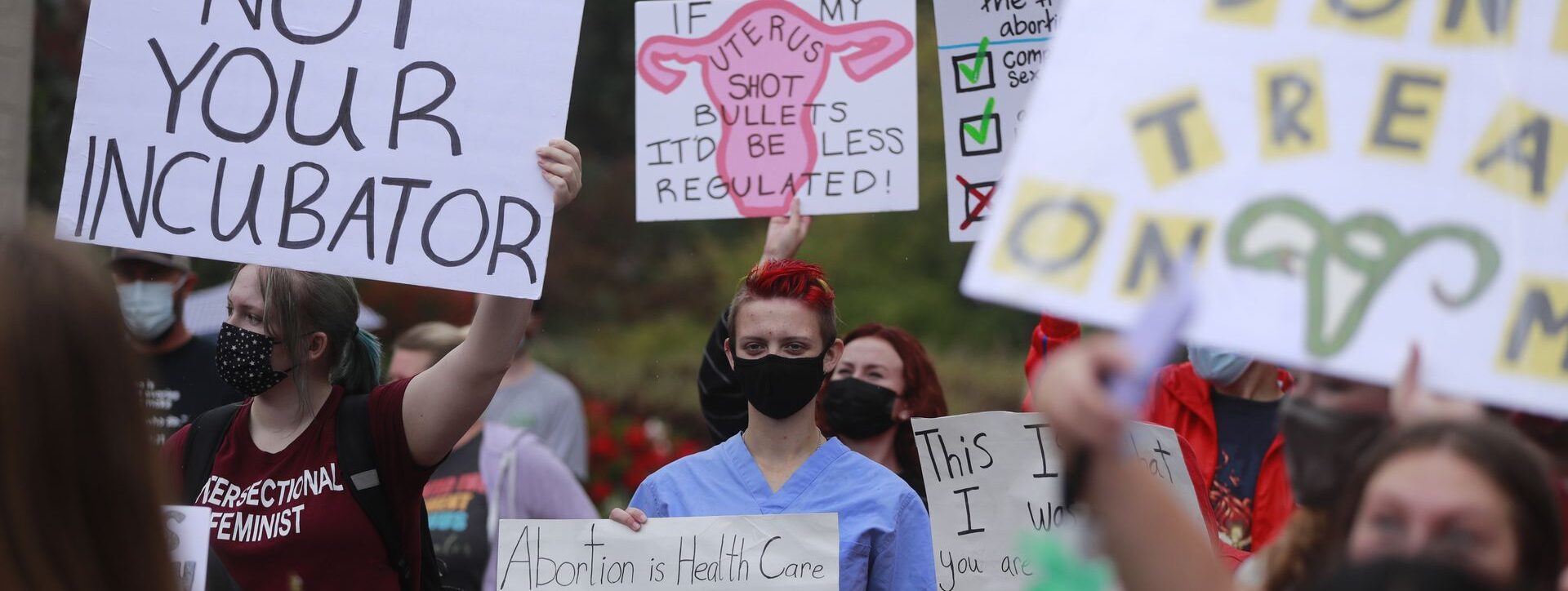International
Biden government to ask Supreme Court to block Texas abortion ban

AFP
President Joe Biden’s administration on Friday said it would ask the Supreme Court to block a ban on most abortions in Texas, in the latest stage of a national battle over reproductive rights.
Last month, the US Supreme Court cited procedural issues when it decided by a 5-4 vote against intervening to block the highly restrictive Texas law.
It did not rule on the merits of the case brought by abortion providers.
Biden’s administration has vowed to fight the Texas ban, citing its interest in upholding Americans’ constitutional rights.
At stake is the landmark 1973 Supreme Court ruling in Roe v. Wade, which enshrined a woman’s legal right to an abortion.
Last week, US District Judge Robert Pitman, in response to a Justice Department lawsuit over the Texas law, issued a preliminary injunction halting its enforcement, calling it “flagrantly unconstitutional” and a violation of Roe v. Wade.
“This court will not sanction one more day of this offensive deprivation of such an important right,” Pitman said in a blistering decision.
Days later, in a complex legal wrangle, the Fifth Circuit Court of Appeals effectively reinstated the ban in Texas on most abortions once a heartbeat is detected in the womb.
On Thursday, the court confirmed the law would remain in place during ongoing proceedings.
The whiplash and temporary nature of the rulings meant only a fraction of Texas’ abortion clinics had begun conducting the procedure again beyond what was allowed under the ban.
Anti-abortion groups cheered the reinstatement, even though the Biden administration was widely expected to appeal to the Supreme Court.
On Friday, a spokesman for the Justice Department confirmed it “intends to ask the Supreme Court to vacate the Fifth Circuit’s stay.”
The department is expected to formally file its appeal in the coming days.
The “Texas Heartbeat Act” allows members of the public to sue doctors who perform abortions, or anyone who helps facilitate them, once a heartbeat is detected in the womb — usually at around six weeks.
They can be rewarded with $10,000 for initiating cases that lead to prosecution, prompting charges that the law encourages people to act as vigilantes.
The law makes no exception for victims of rape or incest.
If the Supreme Court were to overturn Roe v. Wade, every state would be free to ban or allow abortions.
The court’s next move will be watched closely, with its initial refusal to intervene seen as confirmation of the bench’s swing to the right following a series of appointments by former president Donald Trump.
The Texas law is part of a broader conservative drive to restrict abortions across the United States that has prompted a public backlash.
Tens of thousands of women took to the streets in cities across the country earlier this month, asserting their reproductive rights.
International
New York Announces First 2,000 Seats in Universal 2-K Program

The Governor of New York, Kathy Hochul, and New York City Mayor Zohran Mamdani took another step today in their universal early education agenda by announcing the communities that will have access to the first 2,000 seats in the new 2-K program this fall — an initiative backed by a $73 million investment.
The funding is part of the $1.2 billion package previously unveiled by Hochul to strengthen child care and early childhood education across the city, one of the key campaign promises of the now Social Democratic mayor.
At the time of the announcement, the governor also outlined additional funds to reinforce the existing 3-K early education infrastructure, a program launched under former Mayor Bill de Blasio (2014–2021).
When the 2-K initiative was introduced in January, Mayor Mamdani explained that its first phase would offer 2,000 seats, with the goal of eventually expanding into a universal program — a commitment supported by the governor.
State investment in child care and preschool services is expected to increase to $4.5 billion by fiscal year 2027.
Among the first communities set to benefit from the 2,000 seats are Upper Manhattan and Inwood — areas with large Dominican populations — as well as Fordham and Kingsbridge in the Bronx, a borough with a Latino majority.
In East Brooklyn, Canarsie, Brownsville, and Ocean Hill will also be included. Meanwhile, Ozone Park and the Rockaways are among the neighborhoods that will see the rollout of the 2-K program.
International
Warner Bros. Developing First ‘Game of Thrones’ Movie With ‘Andor’ Writer

Warner Bros. is developing the first feature film based on the hit saga Game of Thrones, with Beau Willimon — screenwriter of Andor — attached to direct, according to a report published Tuesday by Page Six.
The project, currently in early development, will focus on the conquest of King Aegon I Targaryen. A separate television adaptation centered on the same historical storyline within the franchise is also in early stages at HBO.
However, the outlet noted that it remains unclear whether the film will move forward following the recent acquisition of Warner Bros. Discovery by Paramount Skydance.
If the merger is finalized, the movie could potentially be shelved, although that scenario appears unlikely given that the Game of Thrones franchise remains one of HBO’s most valuable and beloved properties.
After six seasons adapting the work of George R. R. Martin, the platform expanded the universe with House of the Dragon, a prequel series set 200 years before the events of Game of Thrones that explores the history of House Targaryen.
International
Spain’s Prime Minister to Address Nation Amid Trump’s Trade Threats

The Prime Minister of Spain, Pedro Sánchez, will deliver an institutional address this Wednesday at the Moncloa Palace regarding the escalating situation in the Middle East and recent threats directed at Spain by U.S. President Donald Trump.
The Spanish government announced that Sánchez will make a statement at 9:00 a.m. local time to outline his position on the latest developments following the U.S. and Israeli attacks on Iran.
Sánchez is expected to reiterate Spain’s reasons for opposing the use of U.S. military bases on Spanish soil in the operation—an action he has already described as being outside international law—while also expressing criticism of the Iranian regime.
Government sources indicated that the address had been planned prior to Trump’s remarks criticizing Spain’s stance. However, following those comments, Sánchez is now also expected to respond directly to the U.S. president’s statements.
Trump has threatened to “cut all trade with Spain” and said he wants “nothing to do” with the country after Madrid refused to authorize the use of the Morón and Rota military bases in southern Spain for operations against Tehran.
The U.S. president also labeled Spain “a terrible NATO partner” and warned that “no one” would tell him he could not use the facilities.
In response, the Spanish government stated that Spain fulfills its commitments to NATO and European defense. It also warned Trump that any review of bilateral trade relations must respect international law and the agreements in place between the European Union and the United States.
-

 International2 days ago
International2 days agoIran Reports 201 Dead, 747 Injured After U.S. and Israeli Strikes
-

 International2 days ago
International2 days agoPope Leo XIV Urges End to ‘Spiral of Violence’ in Middle East
-

 International4 days ago
International4 days agoTrump Floats “Friendly Takeover” of Cuba Amid Rising Tensions
-

 Sin categoría3 days ago
Sin categoría3 days agoTrump: ‘We Think It’s True’ Amid Claims Iran’s Supreme Leader Was Killed
-

 International3 days ago
International3 days agoSecurity Council to Hold Emergency Meeting on Middle East Crisis
-

 International1 day ago
International1 day agoBrazil’s Supreme Court Rejects Bolsonaro’s Bid for House Arrest
-

 International4 days ago
International4 days agoArgentina’s Senate Reviews Milei-Backed Labor Overhaul
-

 International1 day ago
International1 day agoAnti-ICE Billboard Campaign Targets Immigration Spending in 31 U.S. Cities
-

 International1 day ago
International1 day agoTrump Warns of ‘Major Wave’ of Attacks as Iran Conflict Escalates
-

 International1 day ago
International1 day agoMexico Calls for Immediate Probe After National Dies in ICE Custody
-

 Central America1 day ago
Central America1 day agoPanama Canal Monitoring Trade as Middle East Conflict Disrupts Shipping
-

 International1 day ago
International1 day agoBolivia Orders Three Investigations Into Deadly Military Plane Crash
-

 International3 hours ago
International3 hours agoNew York Announces First 2,000 Seats in Universal 2-K Program
-

 International3 hours ago
International3 hours agoSpain’s Prime Minister to Address Nation Amid Trump’s Trade Threats
-

 International3 hours ago
International3 hours agoWarner Bros. Developing First ‘Game of Thrones’ Movie With ‘Andor’ Writer
-

 Central America3 hours ago
Central America3 hours agoGuatemala’s Attorney General Fails in Bid for Top Court Seat Amid Corruption Allegations




























